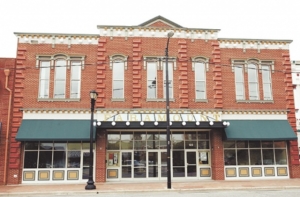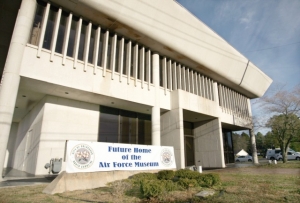City's money dilemma
By Ty Johnson
Published in News on February 26, 2012 1:50 AM

News-Argus file photo
The Paramount Theatre's debt service had been covered by funds from the hotel occupancy tax, which could be an issue if the museum project depletes the funds, officials say.

News-Argus file photo
The costs associated with the potential Air Force museum were one of the topics of conversation at the city's recent budget retreat.
The Goldsboro City Council retreat unofficially kicked off the budget season as council members poured over ideas during the two-day event, which was heavy on financial discussions as the city eyes the beginning of the fiscal year July 1.
The city's budget-building process begins in earnest in spring, but there was no shortage of topics at the Paramount Theatre, where the retreat was held, that will factor into the city's 2012-13 spending plan.
During the first day of discussions, Finance Director Kaye Scott discussed the city's 10-year financial plan, which projected modest growth in revenue and an effort to rebuild the city's general fund balance, which has been depleted in recent years, even leading the Local Government Commission to address a letter to the city highlighting its concern with the downward trend.
Representatives from the city's financial consultant, Davenport, addressed the council on day two of the retreat and said the letter was simply to raise awareness of the trend, not to invoke panic.
When asked by Mayor Al King about the city's financial standing, Ted Cole, the firm's senior vice president, said outside of the shrinking fund balance, there were no concerns.
"I don't think I see anything here of concern outside of a decline in fund balance," he said. "You're not at a critical level."
King said he wanted to emphasize that notion for critics of the city who had claimed it was broke and had serious financial problems. The representatives, along with Mrs. Scott, explained that the city was not broke, nor was it rich.
"We're paying all our bills," Mrs. Scott said.
City Manager Scott Stevens brought forward items for discussion to increase the city's revenue through means other than tax increases -- mostly through new or increased fees.
One discussion about increasing revenue concerned the very theater the council members were sitting in.
Paramount Theatre Director Sherry Archibald shared ideas for increasing the venue's revenue through adding performances, increasing rental fees and showing old movies in the theater to increase visibility. She also said the theater was considering mandatory ticket sales from the Paramount box office.
Statistics plotting the theater's revenues versus expenditures were also shared, showing that while revenues have increased by more than $50,000 since the 2008-09 fiscal year, expenditures have increased by some $60,000 in the same timeframe, plunging the theater even further into debt. With debt service on the theater's renovation considered, the department lost $660,926 in 2010-11, while the total loss without factoring in debt service was $180,461.
The theater's debt service in past years has come from the city's occupancy tax fund -- a coffer built on taxes levied on hotel rooms in the city as part of the city's civic center fund. That will change in the next year or two, however, as the city is looking to move the Paramount debt service payment to the general fund.
In a June presentation to council, Mrs. Scott explained the debt service could possibly be moved to the general fund in fiscal year 2012-13, but during the retreat it was thought the shift might be delayed until 2013-14.
The reason behind the shift is the depleted occupancy tax fund and that fund's inability to support both the Paramount's debt service and the council's proposed Air Force museum project.
The $500,000 purchase of the building at 2406 E. Ash St. and anticipated repair and operating costs should the building become a museum would wipe out the occupancy tax when coupled with the annual debt service for the Paramount. There are 11 years remaining of the Paramount debt service.
When the original Paramount Theatre on Center Street burned down in February 2005, the Paramount Theatre Foundation was formed so that donations toward the rebuild effort could be tax-deductible. Ownership of the theater was transferred to the foundation with the understanding that the city would buy the property back upon the completion of the construction. The city also agreed to pay any accrued interest from the loans taken out for the theater construction by the foundation.
The payments began in 2008, when the city was on the hook for $433,000. The council agreed to use $333,000 from the occupancy tax fund to make the payment, with the remainder coming from the general fund. When the city obtained ownership of the theater later that year, it approved a $4.5 million, 15-year loan for the purchase price. The estimated payback amount, Mrs. Scott said at that time, was $6,083,325. She said at a recent council meeting that no banks were interested in refinancing that loan, saying the financial institutions contacted considered the building "non-essential."
The city has since used the occupancy tax for the payments, but that might change as early as this budget season.
Also discussed at the retreat was the city's intention to once again take over fully the Goldsboro Travel and Tourism Department. The Wayne County Chamber of Commerce had already budgeted for Betsy Rosemann, director, and her staff to be fully within the city's jurisdiction, although there won't be a physical move of the department. The council approved the authorization of the travel and tourism positions within the city during the retreat.
The ultimate goal, it was revealed, is to move the travel and tourism department to the city's East Ash Street building to be support staff for the Air Force museum. A citizens committee formed to gauge the sensibility of the museum has issued its request for proposals and is scheduled to meet with consultants Feb. 21 to discuss options to move forward with the public input survey.
